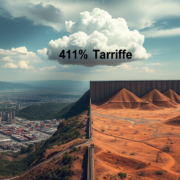Wells Fargo and Pfizer CEOs Sound the Alarm: U.S. Must Innovate or Risk Losing to China
Wells Fargo and Pfizer CEOs Warn U.S. Must Innovate to Compete with China
At CNBC’s first Invest in America Forum in Washington, D.C., two top business leaders warned about the U.S. losing its place in the world market. Wells Fargo CEO Charlie Scharf and Pfizer CEO Albert Bourla stressed the need for fresh ideas if the U.S. is to stay ahead of China.
AI as a Double-Edged Sword in U.S. Productivity
Charlie Scharf pointed out how AI changes work in finance. AI helps code teams work 20% to 40% faster. It does this by letting computers take on tasks that people once did. Still, it cuts the number of needed workers.
Scharf said, "We will likely have less people, absolutely." He meant that even though work moves faster, Wells Fargo keeps many staff and still gets more done. At other banks like JPMorgan Chase and Goldman Sachs, fewer hires are already the norm as AI joins daily tasks. He also mentioned that new rule changes could adjust money rules at banks. Such rule changes may let smaller banks work better with their communities even when Washington stays still.
China Closing the Gap in Biotechnology and Pharmaceuticals
Pfizer CEO Albert Bourla shared his worry over China’s fast moves in biotech and drugs. He noted that China now files more patents than the U.S. Bourla warned that if this pace persists, China might pull ahead in health science work.
"Five years ago, the U.S. led with a 90%-to-10% share in patents," Bourla said. "That gap is shrinking, and they might soon do better than us if we do not act soon." He urged change in how efforts are made. He said the U.S. must focus on doing more work, trying fresh ideas, and keeping rules steady.
Removing Barriers for Innovation
Bourla also spoke against trade duties and uncertain prices that slow progress. In a move to keep drug prices steady, Pfizer agreed with the previous administration on a three-year break from specific drug duties. This break came with a promise to keep building drug plants in the U.S.
"Tariffs and price shocks are now less of a worry," Bourla said. He added that AI stands as the next phase in medicine. He looks forward to AI cutting the time needed to find new treatments, especially for hard diseases like Alzheimer’s and cancer.
"We have tried for years to find cures. AI will make it happen," he said.
The Call for Investment and Policy Change
Both CEOs agreed that more spending on new tech and factories is needed soon. They stressed that clear and steady rules must back these efforts. This will help the U.S. lead in new fields and counter the rise of China in world markets.
As the U.S. economy meets new tests, leaders like Scharf and Bourla call for a renewed focus on fresh ideas, smart use of AI, and simple rules. This path will help America stay at the front of science and business progress.
For more insights and coverage on U.S. economic policy and innovation, stay tuned to CNBC.
Full money-growing playbook here:
youtube.com/@the_money_grower









